Thekua are crisp crunchy cookies flavored with traditional Indian spices. These delicious fennel and cardamom scented deep fried cookies are a family favorite. If crunchy cookies are your preference, try this traditional Indian recipe today!
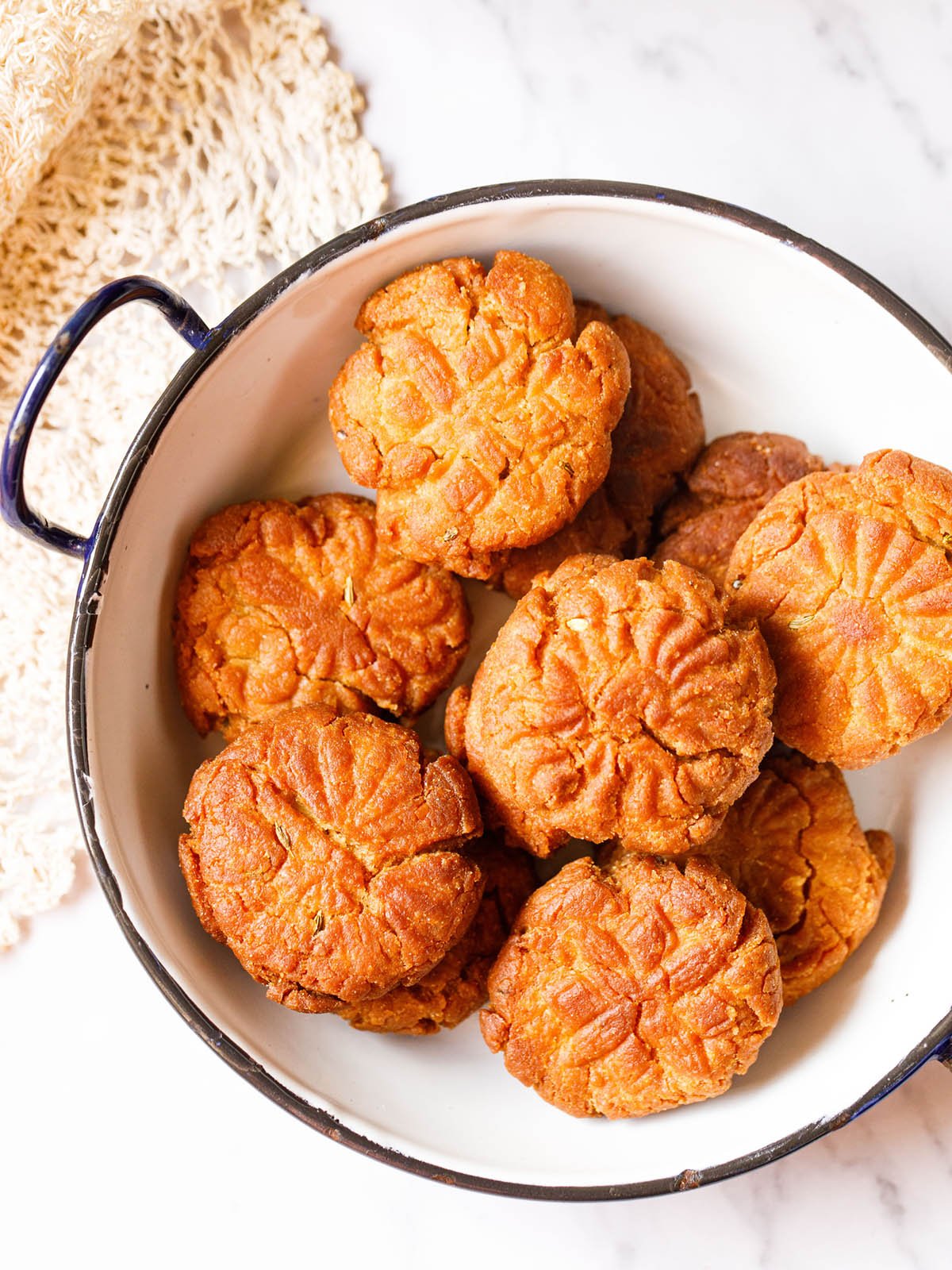
What is Thekua
Thekua is a traditional sweet from Eastern Indian states of Bihar and Jharkand. It is made during Chhath Puja, a festival dedicated to the Sun God (Surya Devta).
These are whole wheat cookies which are deep fried. The sweet aroma of fennel seeds and cardamom plays beautifully with the caramel-molasses flavor from jaggery.
This recipe will give you crispy and crunchy exterior with a soft interior, which to me is perfect for a cookie. Thekua have uneven cracked edges, making them both rustic as well as crunchy.
They will not look like a perfectly even cookie! The signature of a perfectly made thekua will be the uneven edges, so do not worry if they are a tad misshapen.
Table of Contents
Traditionally moulds with leaf or round patterns are used. Not to worry if you do not have these decorative moulds. You could use a cookie press, or even make designs on these fried cookies with a tooth pick or a wooden skewer.
As cooler weather approaches and the days become shorter, the tradition of tea time becomes even more important to me.
This thekua recipe is a delightful treat to serve with a warm cup of your favorite chai, as their crunchy exteriors make them a perfect dipping cookie.
If you’re in need of something to look forward in the darker afternoons, try these delightful Indian cookie.
Is Thekua the same as Khajuri?
While the two Indian sweets are quite similar in how they are made and even in their taste profile, thekua and khajuri are actually different sweets.
The difference between thekua and khajuri is that thekua is made from whole wheat flour and jaggery, while khajuri is made with all-purpose flour and sugar.
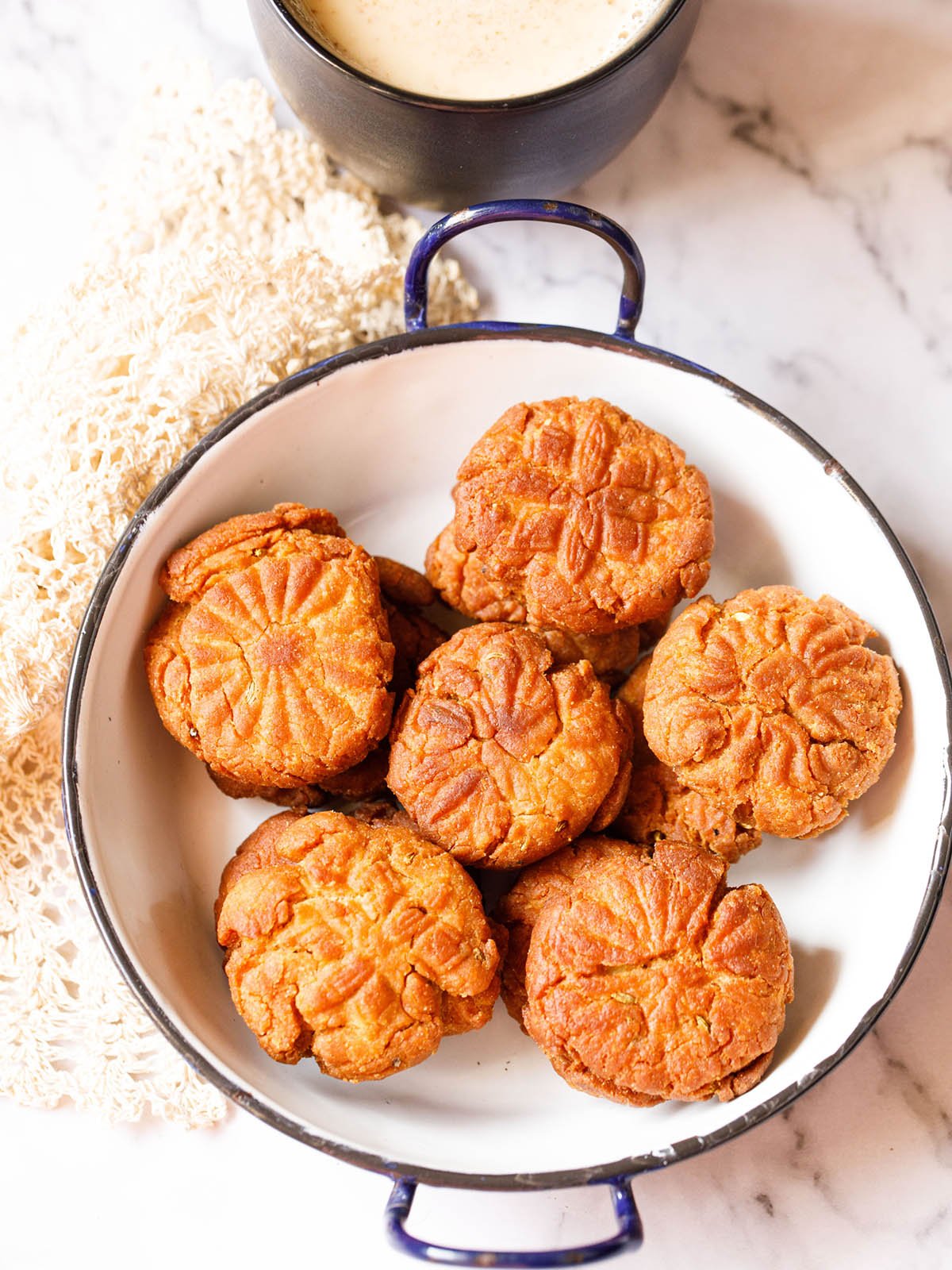
How to Make Thekua
With my step-by-step photo instructions, you can make thekua easily and perfectly every time.
Make Thekua Dough
1. Whisk together the below listed dry ingredients in a mixing bowl.
- 1.25 cups whole wheat flour (155 to 160 grams)
- 1 pinch salt
- 1 teaspoon fennel seeds
- 1 tablespoon fresh grated coconut or desiccated coconut
- ½ teaspoon green cardamom powder
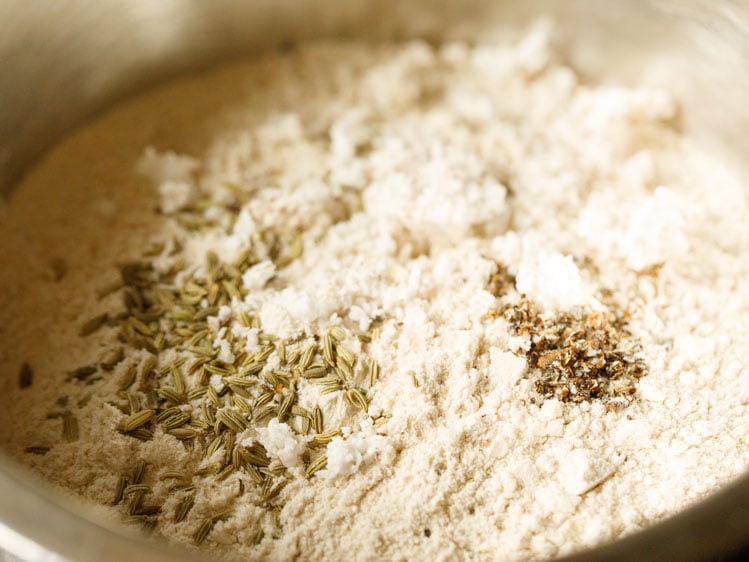
2. Melt 3 tablespoons ghee (25 grams) until hot.
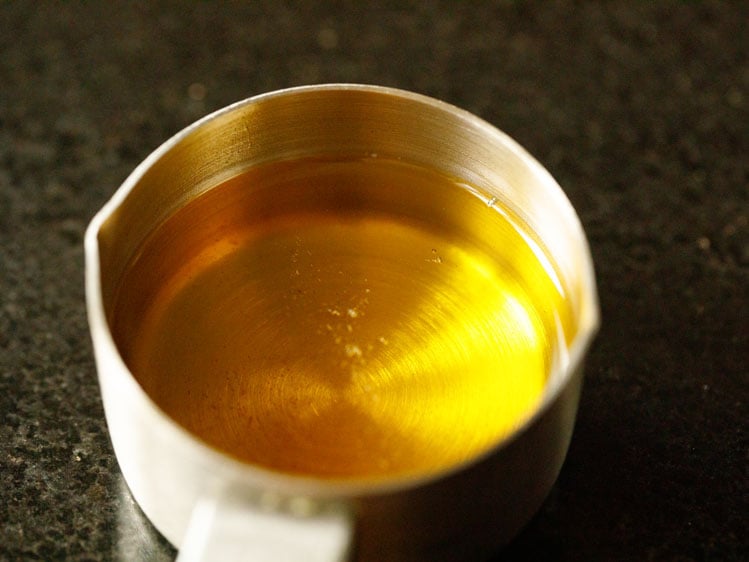
3. Add hot ghee to the dry ingredients.
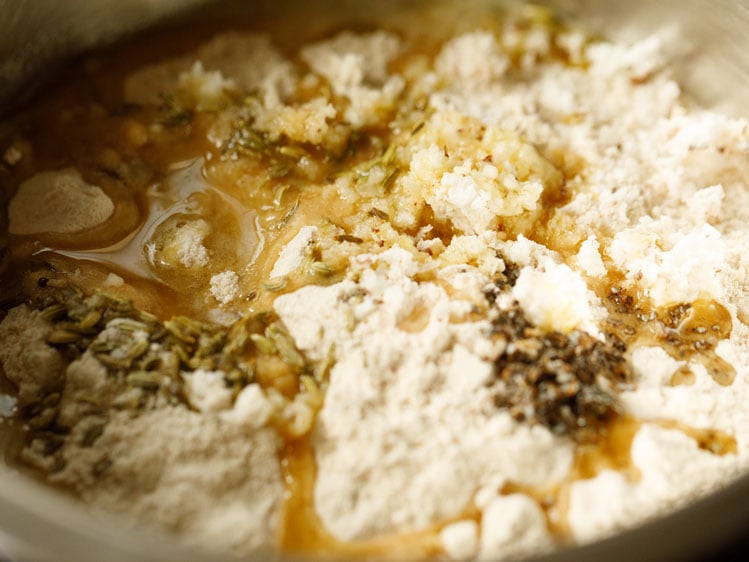
4. Mix with a spoon.
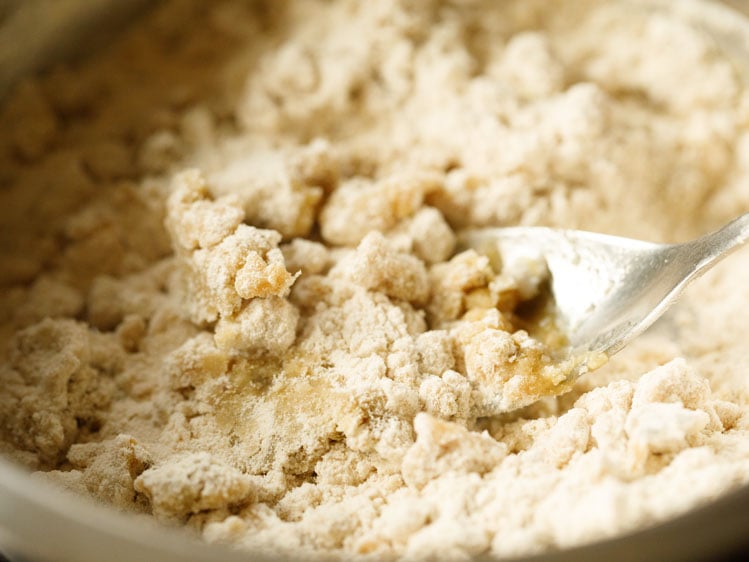
5. Ensure that the mixture is warm or cool enough to handle and then mix the ghee with the flour until you get a breadcrumb-like consistency.
When you press the mixture it should form a lump and not fall apart.
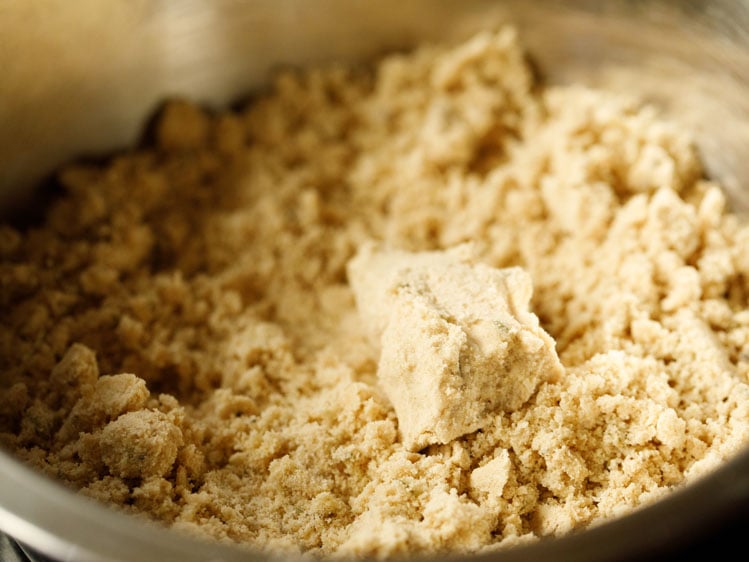
6. Mix ½ cup chopped jaggery (85 grams) with ¼ cup water in a small saucepan.
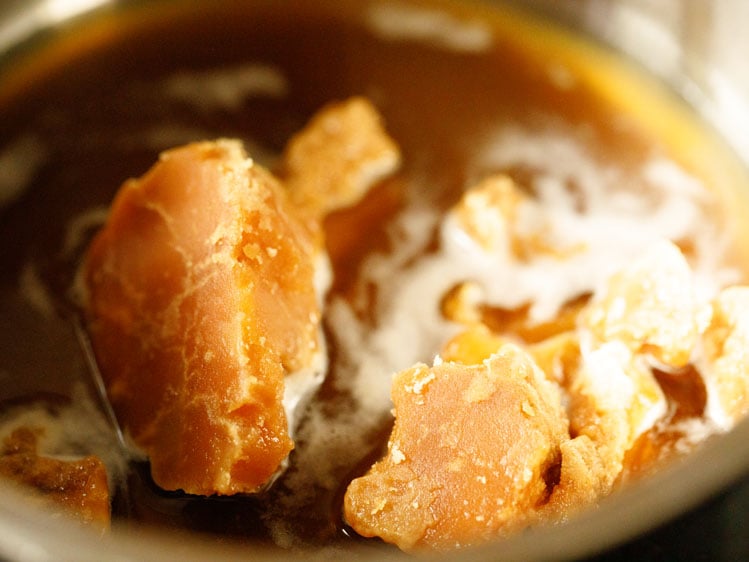
7. Heat until all the jaggery melts on a medium-low heat.
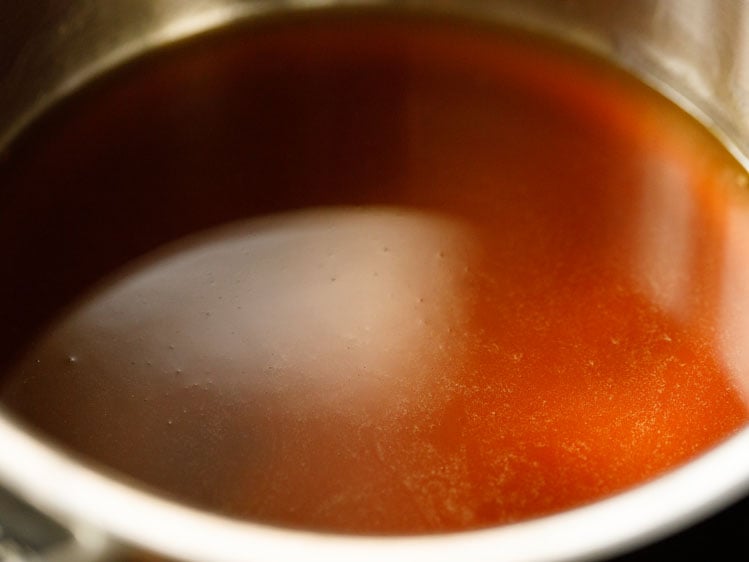
8. Add hot jaggery solution to the flour, working in small batches. Add a few tablespoons of the jaggery liquid at a time.
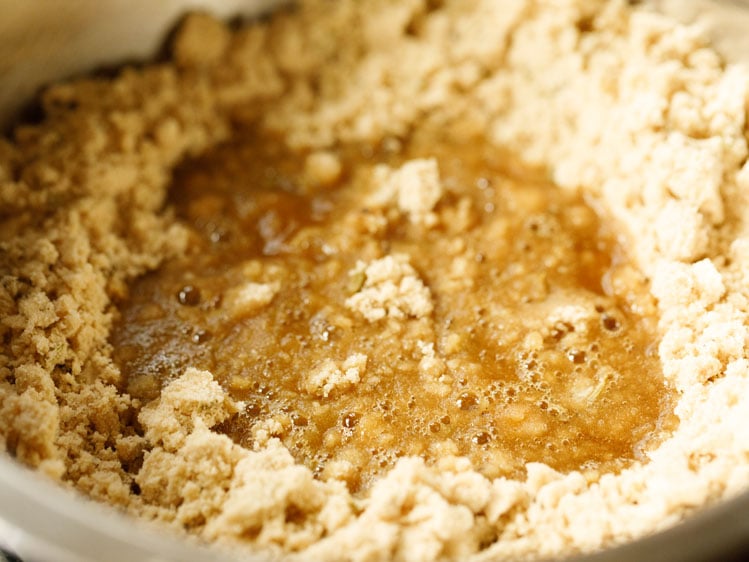
9. Mix with a spoon first.
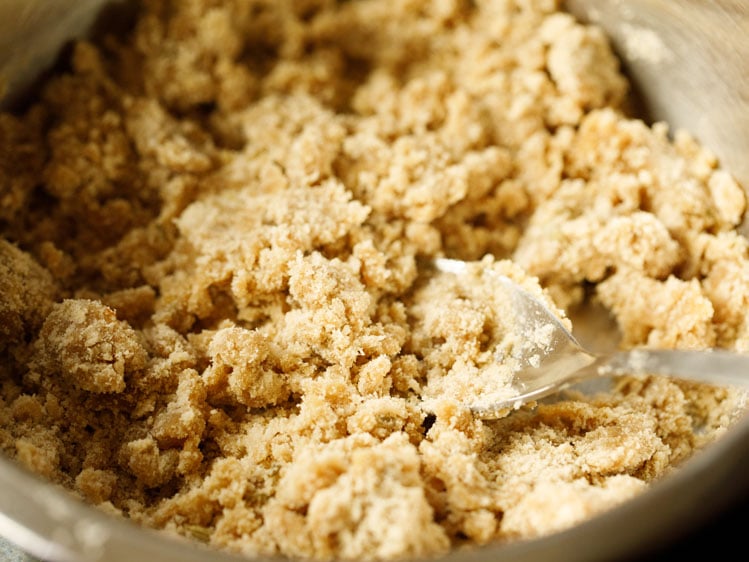
10. Keep on adding in jaggery solution and mixing. Continue until all of the jaggery solution has been added.
Then mix and begin to bring the entire dough together and knead lightly. Do not overwork the dough.
Make a firm or semi-soft dough. Cover with a lid or kitchen cotton towel and rest for 15 minutes.
If the dough has become sticky, add some flour and mix. If it looks dry or crumbly, add some water and combine with the dough.
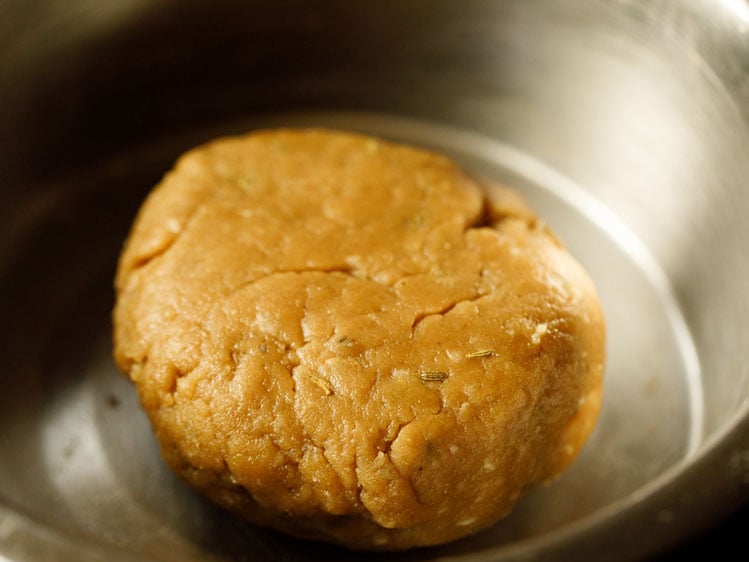
Shape Dough
11. Make small balls from the dough. You can use a small “disher” or ice cream scoop to achieve even quantities of dough.
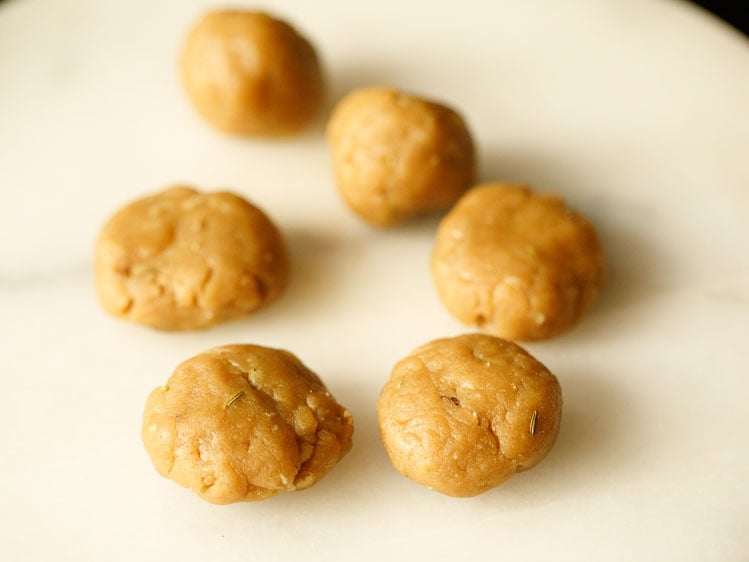
12. Flatten lightly with your palms or with a rolling pin.
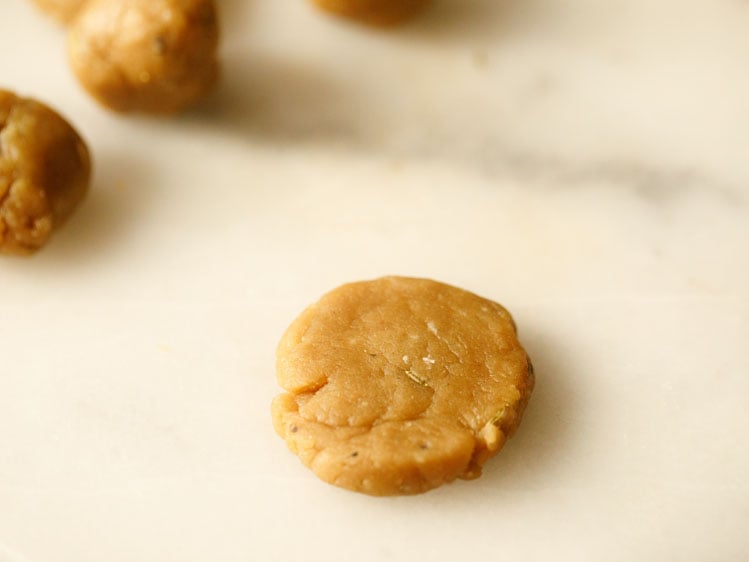
13. Make patterns on the pressed dough using a fork or a toothpick or bamboo skewer.
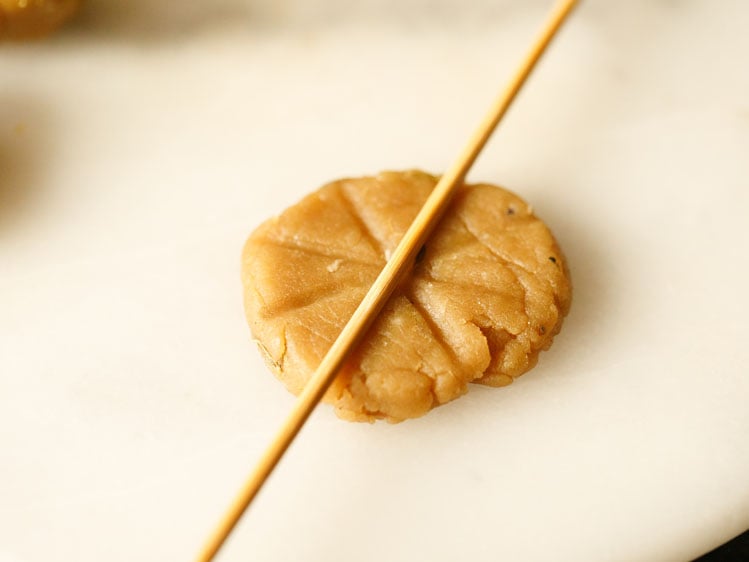
14. You can make any patterns you like!
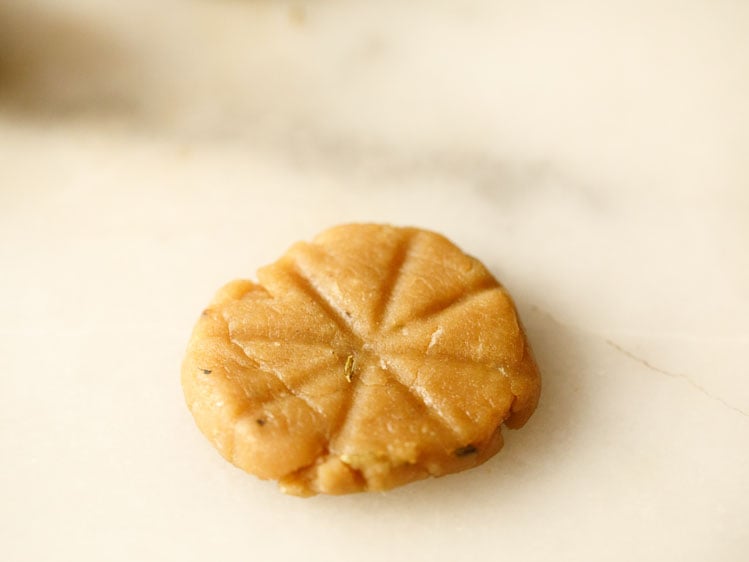
15. You can also press with a Peda (Indian milk fudge) maker or a cookie press, or use cookie stamps.
Keep the prepared discs covered with a kitchen napkin to preserve moisture until ready to fry.
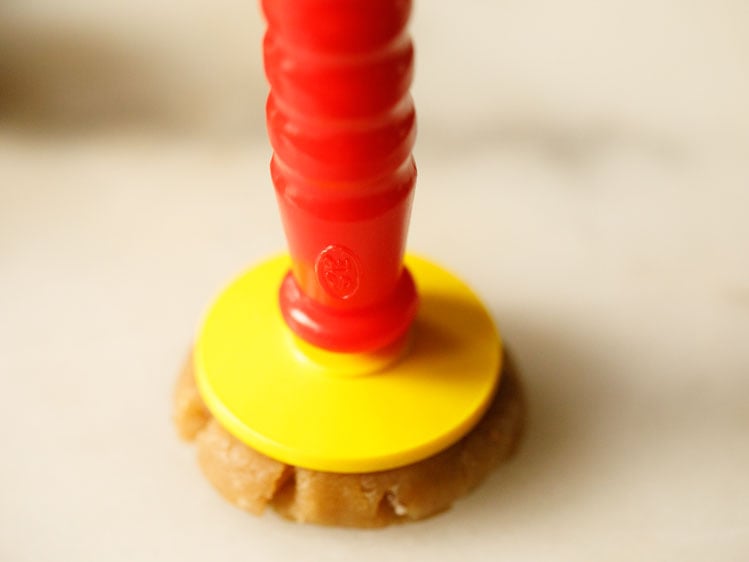
Fry Thekua
16. Heat 1.5 cups oil in a kadai or wok. Check a small piece of dough in the oil. If it is comes up gradually on top, the oil is hot.
Then lower the heat to low or medium-low and gently place the thekua in hot oil. Do not overcrowd the oil with the discs while frying.
You can use a heavy bottomed saucepan and a neutral flavored, high smoke point oil. Canola, sunflower, peanut, vegetable or grapeseed oil are some choices.
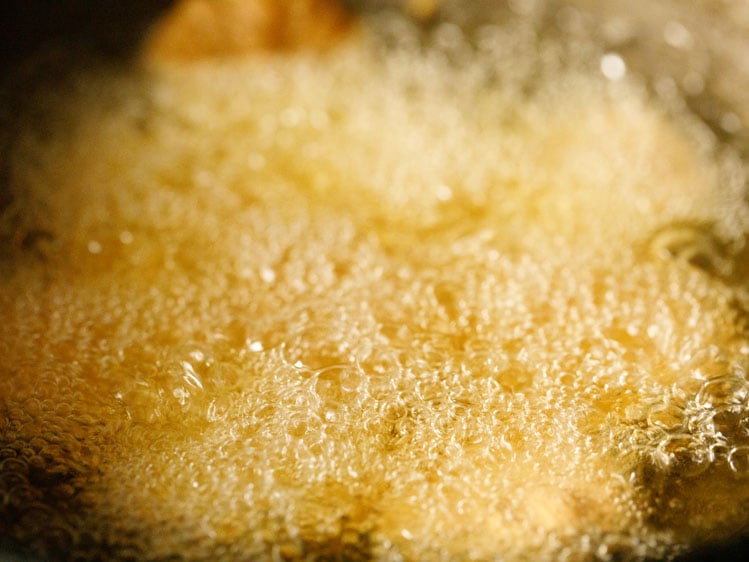
17. When one side is golden, gently turn over and fry the second side. Be very careful when turning and do it gently with a dinner spoon so that they do not break.
Turn over a couple of times and fry till golden and crisp. Jaggery gives a deeper golden color unlike plain sugar.
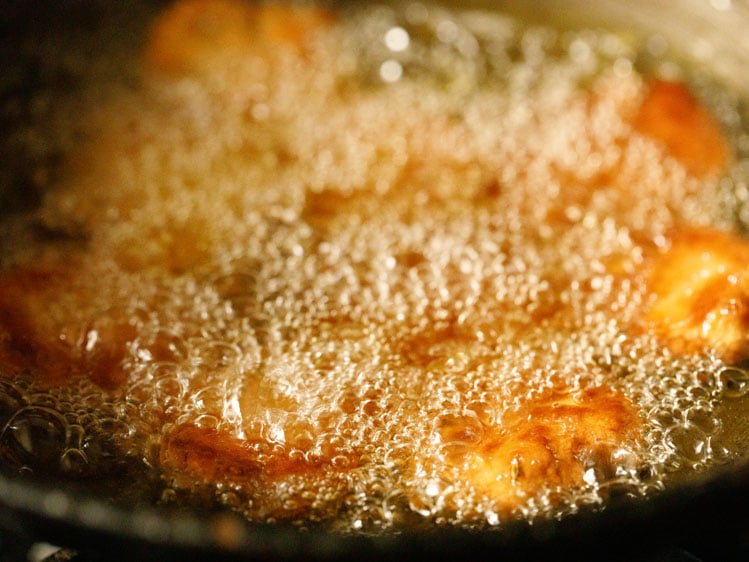
18. Place on kitchen paper towels to drain.
In batches fry the remaining shaped cookies until golden & crisp and then place them on kitchen paper towels.
When the thekua are cooled to room temperature, store in an airtight container.
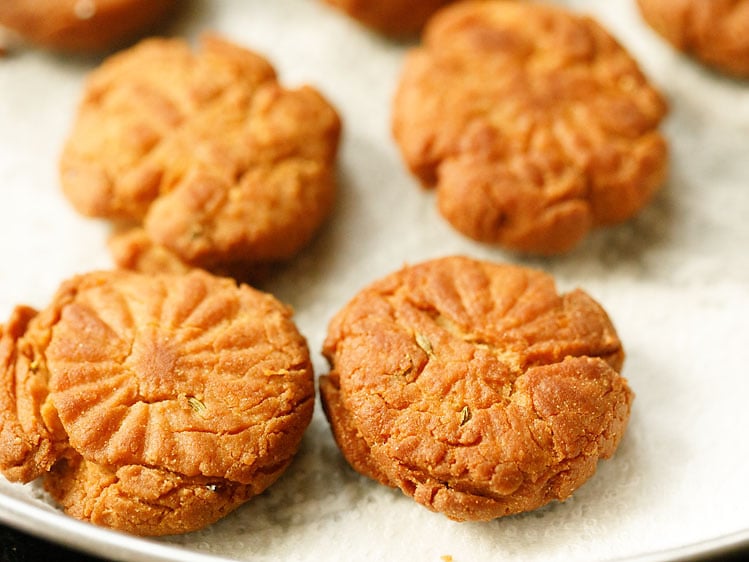
Serve Thekua as a tea time snack or to celebrate Chaath Puja. Enjoy!
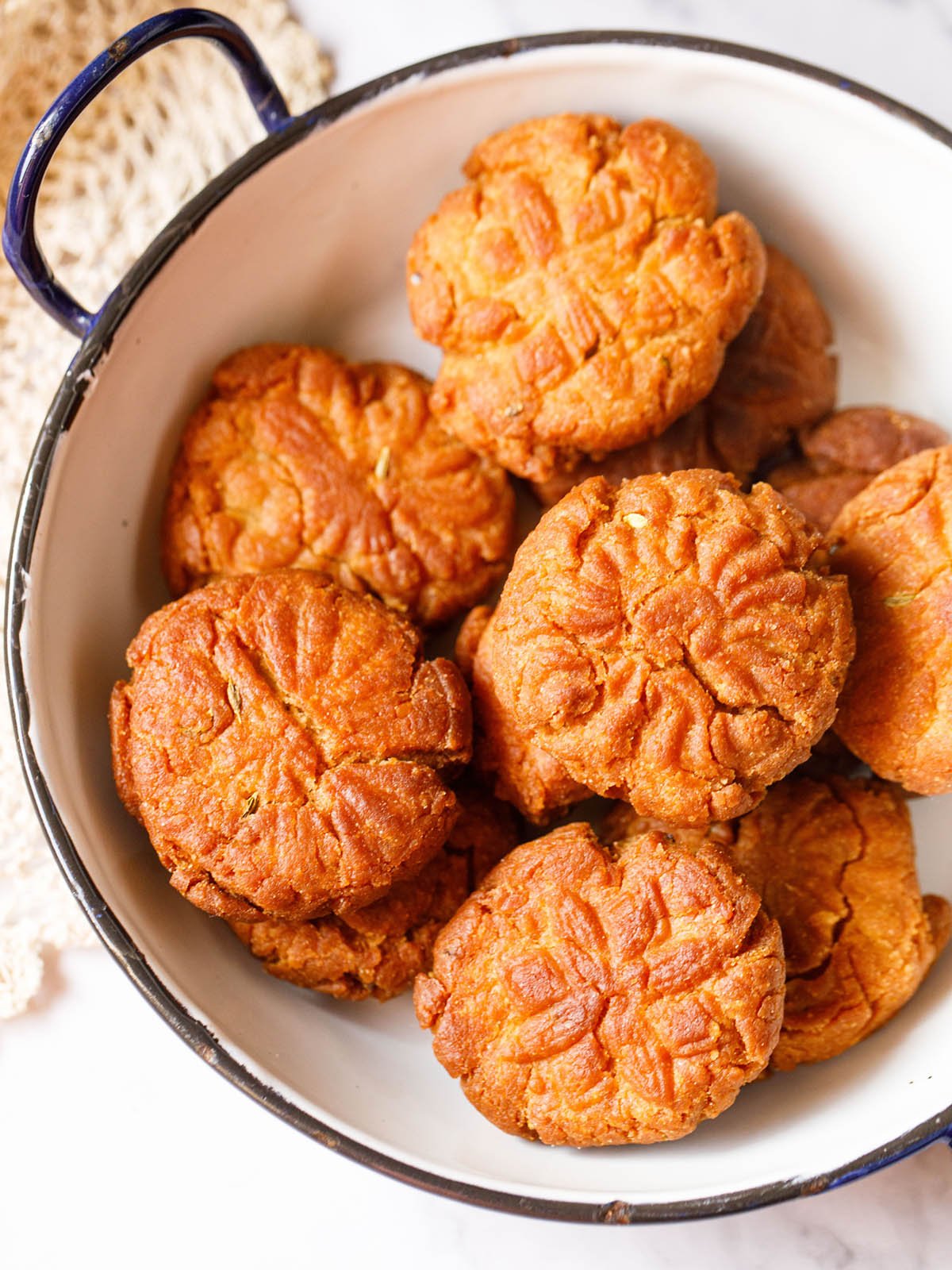
Storage Suggestions
Always store these Indian cookies in an air-tight jar or container. They keep well at room temperature for about a week. You can also opt to store them in the fridge.
If you make thekua with milk, store them in the fridge in an air-tight container.
Ingredient Variations
- Liquids: You can easily swap water with milk. A version of thekua is made with milk which makes it even more richer.
- Jaggery: If you are unable to find jaggery, you can substitute dark brown sugar, light brown sugar or granulated white sugar, raw sugar and even molasses. Just note that the complex flavor of the jaggery will be missing from your final product.
- Coconut: You can either use dry desiccated coconut or fresh grated coconut. If not available, then choose to skip it.
- Spices: Both the spices fennel seeds and cardamom powder are essential, so these cannot be skipped.
- Flour: For a lighter and more tender variation of thekua, you can use all-purpose flour (maida) or even equal proportions of whole wheat flour or all-purpose flour. But note that you will need to add less water when using all-purpose flour.
Dough Troubleshooting Tips
What you are looking for is a dough that has a little bit of elasticity. It should be somewhere between a semi-soft and a firm dough.
- If your dough looks crumbly and dry, add a few tablespoons of water. Mix and lightly knead again.
- If your dough has become sticky or too soft, add a few tablespoons of flour. Combine the flour with the remaining dough by mixing and lightly kneading.
Once you make this thekua recipe a few times, you’ll be able to intuit the right consistency a bit more easily!
Why are my thekua becoming so dark?
Thekua should be a lovely shade of golden brown when cooked properly. Before you begin frying, a good temperature to aim for is 180C – 190C (360F-375F), which you can easily measure with a deep fry/candy thermometer.
If you do not have a thermometer at the ready, there are three ways to check the temperature:
1. First, you can drop a small bit of your dough in the oil. If it rises to the surface gradually and begins to bubble at the top, the oil is ready.
2. Secondly, you can drop a small piece of bread into the shimmering oil. If it cooks to a golden brown in about 60 seconds, the temperature is right. Should the bread remain pale, the oil requires more time to heat. If the bread becomes too dark during a 60 second window, the oil is too hot and should cool first.
3. Thirdly, you can drop a kernel of popcorn in your oil as it is heating. The popcorn will pop at about 180 degree C/360 degree F, so once the kernel pops you should be close to an appropriate temperature.
Do not fry on a high heat as the thekua will darken too quickly leaving the inside dough uncooked. Fry at a low or medium-low heat.
Turn only when one side is golden and do it gently. Take care when frying these cookies, as they are quite delicate.
To turn the thekua, you can use two chopsticks to gently flip it in the oil. You can also use a spider skimmer instead.
What is Jaggery and where can I find it?
Jaggery is the Indian name for an unrefined cane sugar made by cooking sugarcane (or sometimes date palm) juice in large metal vats.
It is known by other names depending on your place of origin – piloncillo or panela are names used in Latin America, rapadura and chancaca in South America, and nam oy in Laos are just a few.
The sugarcane juice is cooked down, leaving a hard deposit that is generally sold in blocks or cones. While you can find it sold in a ground form, I do not recommend it.
Jaggery has a far more complex taste than brown sugar, which is usually comprised of granulated sugar and a bit of molasses. It has earthy, caramel and smoke undertones, making it a truly delightful and unique ingredient for making sweets.
Jaggery is ubiquitous in Indian markets. However, if you are abroad you should be able to find it at International or Indian specialty grocers, as well as at Latin supermercados.
You can also purchase jaggery online, however the price is often inflated above what you can purchase it for in a regular grocery setting.
FAQS
Absolutely! Just increase the ingredients in proportional quantities.
The thekua will store for up to a week in an airtight container after cooking. You can also make the dough for this thekua recipe the night before you fry them and refrigerate it in plastic wrap.
Just be sure to allow the dough to come to room temperature before shaping and frying, or it may break.
This Thekua recipe makes for a lightly sweetened cookie. If you are looking for a sweeter taste, you can increase the amount of jaggery used.
More Indian Sweets Inspiration!
Eggless Cookies & Biscuits
Sweets Recipes
Sweets Recipes
Sweets Recipes
Please be sure to rate the recipe in the recipe card or leave a comment below if you have made it. For more vegetarian inspirations, Sign Up for my emails or follow me on Instagram, Youtube, Facebook, Pinterest or Twitter.
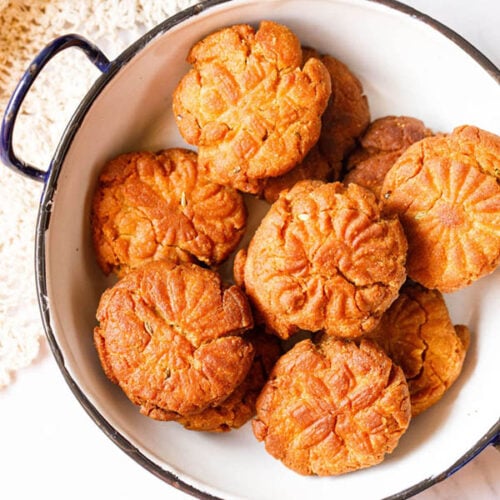
Thekua Recipe (Chaath Puja Special Sweet)
Ingredients
- 1.25 cup whole wheat flour – 155 to 160 grams
- 1 pinch salt
- 1 teaspoon fennel seeds (saunf)
- 1 tablespoon fresh grated coconut or desiccated coconut
- ½ teaspoon green cardamom powder or seeds of 4 to 5 green cardamoms crushed in mortar-pestle, husks removed
- 3 tablespoons Ghee – 25 grams
- ½ cup chopped Jaggery – 85 grams
- ¼ cup water or add as required
- 1.5 cups oil – for deep frying, any neutral tasting oil
Instructions
Making dough
- Take the wheat flour, salt, fennel seeds, grated coconut and cardamom powder in a mixing bowl. Mix well and set aside.
- In small bowl or pan, melt ghee until hot.
- Add this hot ghee into the dry ingredients and mix with a spoon.
- When the mixture becomes warm or cool enough to handle, then using your fingers mix the ghee with the flour till you get a breadcrumb consistency. When you press the mixture it should form a lump.
- In a saucepan take the jaggery and water.
- Heat until all the jaggery melts on medium-low flame.
- Add hot jaggery solution in parts to the flour and mix with a spoon first.
- Keep on adding in parts and mixing and then begin to bring the dough together and knead lightly.
- Make a firm or semi-soft dough.
- Cover the dough with a kitchen towel and rest for 15 minutes.
Shaping
- Later make small balls from the dough.
- Lightly flatten the dough balls with your palms or with a rolling pin.
- Press the flattened discs with a peda maker, cookie press or using a toothpick, fork or bamboo skewers make design patterns.
- Keep covered with a kitchen napkin or kitchen towel.
Deep frying
- Heat 1.5 cups oil in a kadai or wok.
- Add a small piece of dough in the oil. If it is comes up gradually on top, the oil is hot.
- Keep the heat to a medium-low and place the prepared discs in hot oil.
- When one side is golden, gently turn over and fry the second side. Be very careful when turning and do it gently with a dinner spoon or a slotted spoon so that they do not break.
- Fry till golden and crisp. Due to jaggery these fried cookies have a deeper golden color.
- Place on kitchen paper towels.
- Fry the remaining shaped cookies in batches until crispy and golden. Place the fried cookies on kitchen paper towels for any extra oil to be absorbed.
- When the cookies cool at room temperature store in an airtight container.
- Serve Thekua as a tea time cookie.
Notes
- Scaling: Easily scale the recipe and make a small or large batch.
- Make ahead & storage: Make thekua and store it for a week in an airtight container after frying. You could also make the dough the night before you fry them and refrigerate it in plastic wrap. Just be sure to allow the dough to come to room temperature before shaping and frying, or it may break.
- Dough texture: If dough looks crumbly and dry, add a few tablespoons of water. If the dough has become sticky or too soft, add a few tablespoons of flour.
- Jaggery substitute: You could use dark brown sugar, light brown sugar or granulated white sugar and even molasses.
Nutrition Info (Approximate Values)
This Thekua recipe from the blog archives was first published on November 2020. It has been updated and republished on November 2023.
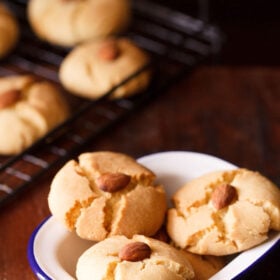
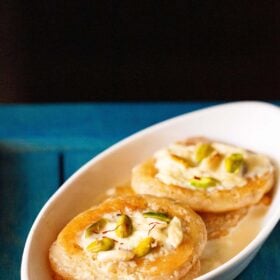
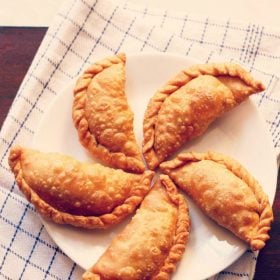
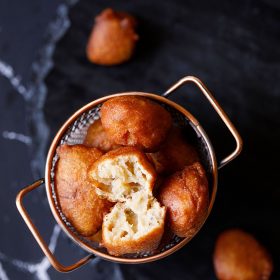
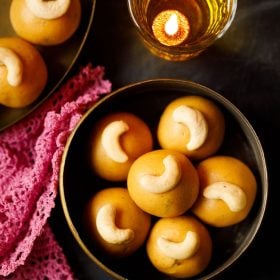
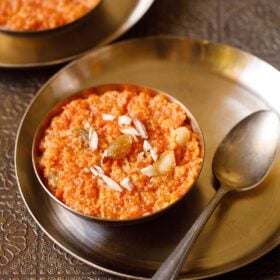
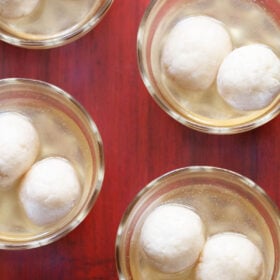
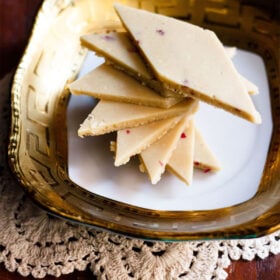








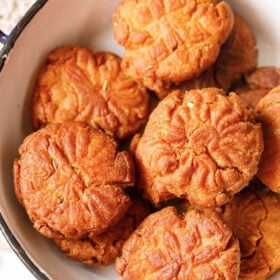
Loved the way of detailing and picture addition was great.
Thank you.
Excellent recipe! I made it and it was awesome. Followed the recipe to the “T”!!
Great and thanks for letting me know.